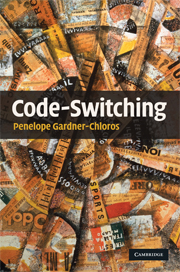Book contents
- Frontmatter
- Contents
- Acknowledgements
- Transcription conventions
- 1 Introduction
- 2 Code-switching and language contact
- 3 Social factors in code-switching
- 4 Code-switching in conversation
- 5 Grammatical aspects of code-switching
- 6 Psycholinguistic approaches
- 7 Acquiring code-switching: code-switching in children (and L2 learners)
- 8 Conclusions
- Appendix
- Bibliography
- Index
8 - Conclusions
Published online by Cambridge University Press: 10 February 2010
- Frontmatter
- Contents
- Acknowledgements
- Transcription conventions
- 1 Introduction
- 2 Code-switching and language contact
- 3 Social factors in code-switching
- 4 Code-switching in conversation
- 5 Grammatical aspects of code-switching
- 6 Psycholinguistic approaches
- 7 Acquiring code-switching: code-switching in children (and L2 learners)
- 8 Conclusions
- Appendix
- Bibliography
- Index
Summary
What do we know about code-switching?
A fundamental argument which underlies this book is that we need to distinguish clearly between idiolectal competence – the real locus of language – and abstract or general conceptions of what a language is. Such general conceptions – e.g. the notion of “correct” English, or Japanese – affect the way people speak (to a greater or lesser extent at different times); but idiolectal competence contains many other elements besides. When bilingual speakers code-switch, because they are in informal mode, they are probably less affected by abstract notions of what a language is or should be than in monolingual production. We cannot assume that CS is always to be viewed as a combination of two entities, which, though they can be mixed in various ways, always retain their essential character. Instead, we should adopt a “common sense” approach, which involves looking at the product in its own right and taking account of its internal variability in constructing theories and definitions.
Studies described in this book highlight various characteristics of CS.
(1) CS is highly variable between communities and between individuals. This variability gives the linguist an insight into how bilinguals' linguistic competence is actually organized, as opposed to how the “languages” which they officially “speak” might, in theory, mesh together. However, up to now, much of the research has been based on an a priori approach. I have suggested that despite the many advances in the study of bilingualism, this is connected with a persistent, if perhaps subconscious, view of monolingualism as the natural state of humans among many linguists. One example of this is the widespread acceptance of the idea that it is meaningful, and even necessary, to talk of a “base language” in bilingual speech (Gardner-Chloros and Edwards, 2004).
[…]
- Type
- Chapter
- Information
- Code-switching , pp. 165 - 180Publisher: Cambridge University PressPrint publication year: 2009



